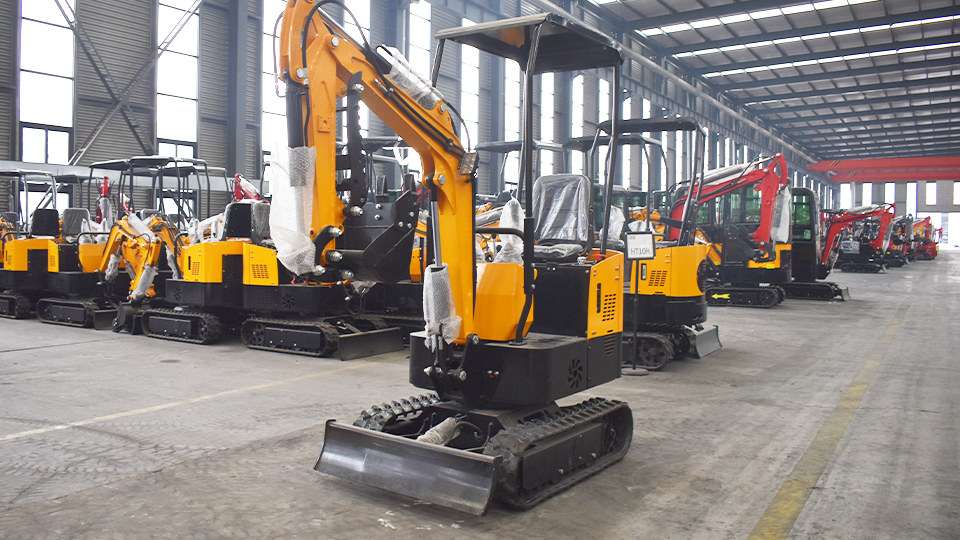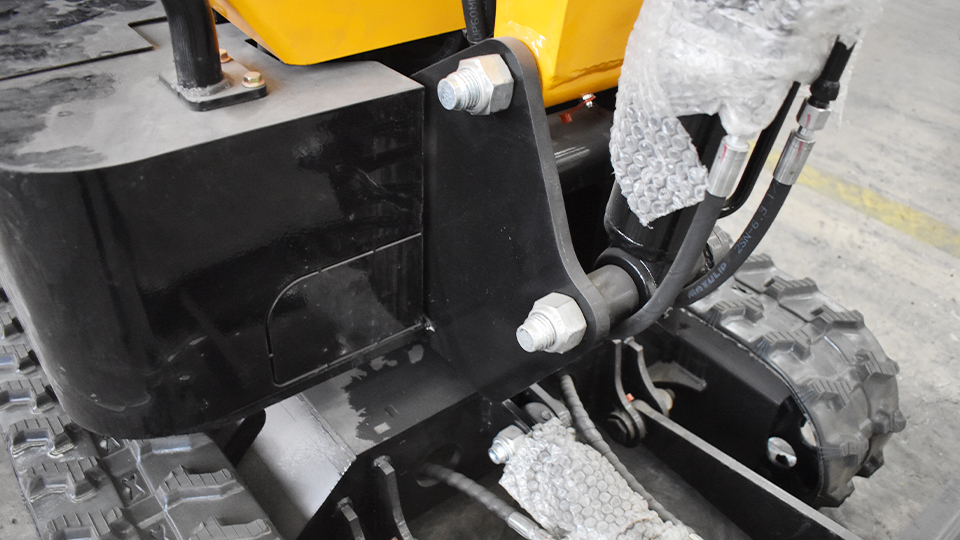Acquiring an excavator is a significant investment for construction companies, contractors, and even large landowners. These versatile machines are essential for a wide range of tasks, from digging and trenching to demolition and material handling. However, the process of finding and purchasing the right excavator can be complex, with numerous options available in the market. This technical article provides a comprehensive guide to the various avenues where you can buy an excavator for sale, outlining the pros and cons of each to help you make an informed decision.
Understanding Your Needs: The First Step
Before embarking on your search, it's crucial to clearly define your requirements. Consider the following factors:
Size and Type: Excavators come in various sizes, from compact mini-excavators ideal for tight spaces to large, heavy-duty models for major construction projects. Determine the typical operating weight and digging depth you'll need. Also, consider if you require a wheeled or tracked excavator based on the terrain and application.
New vs. Used: New excavators offer the latest technology, full warranties, and a clean operating history. Used excavators can be more budget-friendly but may require more maintenance and come with varying levels of wear and tear.
Budget: Establish a realistic budget that includes the purchase price, potential transportation costs, and any immediate maintenance or accessory needs.
Features and Attachments: Identify any specific features you require, such as auxiliary hydraulics for attachments (hammers, grapples, augers), quick couplers for easy attachment changes, or specific cab features for operator comfort and safety.
Brand Preference: Some buyers have a preference for specific manufacturers known for their reliability, performance, or dealer support. Research different brands and their reputations.
Where to Buy: Exploring Your Options
Once you have a clear understanding of your needs, you can begin exploring the various places where excavators are typically sold:
1. Authorized Dealers:
Description: Authorized dealers are franchised businesses that sell new excavators from specific manufacturers (e.g., Caterpillar, Komatsu, John Deere, Kubota, Bobcat). They often provide comprehensive support, including parts, service, and financing options.

Pros:
New Equipment: Access to the latest models with full manufacturer warranties.
Expert Knowledge: Sales staff with in-depth knowledge of the specific brands they represent.
Parts and Service: Established service departments with trained technicians and readily available genuine parts.
Financing Options: Dealers often have partnerships with financing companies to offer competitive loan or lease options.
Demonstration Opportunities: You may be able to test operate equipment before purchasing.
Trade-in Options: Dealers may accept trade-ins of your existing equipment.
Cons:
Higher Prices: New equipment from authorized dealers generally comes at a premium.
Limited Brand Selection: Dealers typically focus on one or a few specific brands.
How to Find: Search online for "[brand name] dealer near me" (e.g., "Caterpillar dealer near me"). Manufacturer websites also usually have dealer locator tools.
2. Independent Equipment Dealers:
Description: Independent dealers buy and sell a variety of new and used construction equipment from multiple manufacturers. They may specialize in certain types of equipment or cater to a broader market.
Pros:
Wider Selection: Often carry a diverse inventory of brands and models, both new and used.
Potentially Lower Prices: Used equipment can be significantly cheaper than new. Independent dealers may also have more flexibility in pricing.
Negotiation Opportunities: There might be more room for negotiation compared to authorized dealers.
Cons:
Variable Quality of Used Equipment: The condition and maintenance history of used equipment can vary greatly. Thorough inspection is crucial.
Limited Warranty Options: Warranties on used equipment may be limited or non-existent.
Potentially Less Specialized Service: Service departments may not be as brand-specific as authorized dealers.
Parts Availability: Sourcing parts for certain brands or older models might be more challenging.
How to Find: Search online for "used construction equipment dealer near me" or "excavator sales." Online marketplaces (see below) can also connect you with independent dealers.
3. Online Equipment Marketplaces:
Description: Numerous online platforms act as marketplaces connecting buyers and sellers of new and used construction equipment. These platforms can host listings from individuals, dealers, and auction companies. Examples include Equipment Trader, Machinery Trader, IronPlanet Marketplace-E, and mini excavator.
Pros:
Extensive Inventory: Access to a vast selection of excavators from across the country or even globally.
Convenience: Ability to browse and compare numerous listings from the comfort of your location.
Price Comparison: Easy to compare prices and specifications from different sellers.
Direct Contact with Sellers: Facilitates direct communication to ask questions and negotiate.
Cons:
Remote Inspection: You may not be able to physically inspect the equipment before purchase, making thorough due diligence crucial. Rely on photos, videos, and seller descriptions. Consider arranging a third-party inspection.
Shipping and Transportation: You will likely be responsible for arranging and paying for shipping, which can be a significant cost.
Varying Seller Reliability: The reliability and transparency of sellers can vary. Research seller reputations and ask for references.
Payment Security: Ensure secure payment methods are used to avoid scams. Escrow services can offer added protection.
How to Find: Search for "used excavators for sale online" or visit the websites of major online equipment marketplaces.
4. Equipment Auctions:
Description: Equipment auctions offer another avenue to purchase excavators. These can be live, on-site auctions or online auctions (e.g., Ritchie Bros. Auctioneers, IronPlanet, bidadoo). Auctions often feature a wide range of equipment, including used excavators from various sources (fleet liquidations, government surplus, etc.).
Pros:
Potential for Lower Prices: You may be able to acquire equipment at a lower price compared to dealerships or private sales.
Large Inventory: Auctions often have a significant number of excavators available.
Transparency (usually): Reputable auction companies typically provide inspection reports and allow pre-auction viewing.
Cons:
"As-Is, Where-Is" Sales: Equipment is typically sold "as-is, where-is" with no warranties. Thorough inspection is critical.
Bidding Wars: Prices can escalate quickly if there is strong interest in a particular machine.
Time Sensitivity: You need to be prepared to bid and potentially make immediate payment.
Buyer's Premiums and Fees: Auction companies often charge buyer's premiums and other fees, which can add to the final cost.
Transportation: You are responsible for arranging and paying for transportation.
How to Find: Search online for "equipment auctions" or visit the websites of major auction companies specializing in construction equipment.
5. Private Sales:
Description: Individuals or small businesses may sell their used excavators directly. This can be found through online classifieds (e.g., Craigslist, Facebook Marketplace), word-of-mouth, or local industry networks.

Pros:
Potentially Lower Prices: You might be able to negotiate a lower price directly with the owner.
Direct Communication: You can directly inquire about the machine's history and maintenance.
Cons:
Higher Risk: No warranties are typically offered, and the buyer bears all responsibility for inspecting the equipment and assessing its condition.
Limited Information: The seller may not have detailed maintenance records or a comprehensive understanding of the equipment's history.
Payment Security: Exercise caution with payment methods to avoid scams.
Transportation: You are responsible for arranging transportation.
How to Find: Check online classifieds, local construction forums, and network within your industry.
Due Diligence: Protecting Your Investment
Regardless of where you choose to buy an mini excavators for rent thorough due diligence is essential to protect your investment:
Inspection: If possible, conduct a thorough in-person inspection of the excavator. Check for leaks, damage, excessive wear, and proper operation of all systems. If you cannot inspect it yourself, consider hiring a qualified third-party inspector.
Maintenance Records: Request and review the complete maintenance history of the machine. Well-maintained equipment is generally a safer investment.
Operating Hours: Note the total operating hours on the machine. Compare this to the age and expected lifespan of the excavator type.
Serial Number Verification: Verify the serial number of the excavator and check for any reports of theft or liens.
Test Operation: If possible, test operate the excavator to assess its performance, responsiveness, and any potential issues.
Ask Questions: Don't hesitate to ask the seller detailed questions about the excavator's history, usage, and any known problems.
Secure Payment Methods: Use secure payment methods and avoid making large upfront payments to unknown sellers. Consider escrow services for online transactions.
Transportation Arrangements: Factor in transportation costs and make arrangements for safe and reliable delivery.
Conclusion: Navigating the Excavator Market
Buying an excavator for sale requires careful consideration of your needs, budget, and risk tolerance. By understanding the various purchasing options available – from authorized dealers and independent sellers to online marketplaces and auctions – and by conducting thorough due diligence, you can navigate the market effectively and find the right machine for your specific requirements. Remember that the cheapest option is not always the best, and investing time in research and inspection can save you significant costs and headaches in the long run.
Post time:Sep-25-2020
